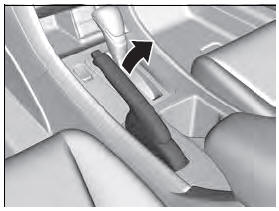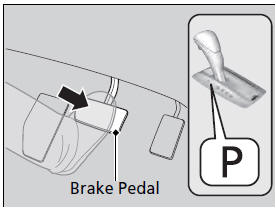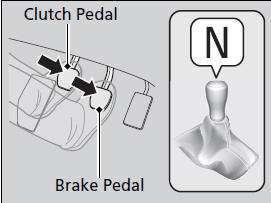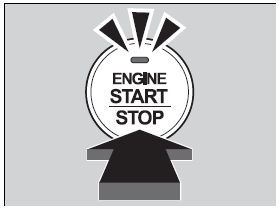 Honda Accord: Starting the Engine
Honda Accord: Starting the Engine

1. Make sure the parking brake is applied.


2. Check that the shift lever is in
 , then
depress the brake pedal.
, then
depress the brake pedal.
- Although it is possible to start the vehicle
in  , it is safer to start it in
, it is safer to start it in
 .
.


2. Check that the shift lever is in
 . Then
depress the brake pedal with your right
foot, and the clutch pedal with your left
foot.
. Then
depress the brake pedal with your right
foot, and the clutch pedal with your left
foot.
- The clutch pedal must be fully depressed
to start the engine.
Keep your foot firmly on the brake pedal when starting the engine.
The engine is harder to start in cold weather and in thinner air found at altitudes above 8,000 feet (2,400 meters).
When starting the engine in cold weather, turn off all electrical accessories such as the lights, climate control system, and rear defogger in order to reduce battery drain.
If you live in a region where winter is extremely cold, an engine block heater will improve starting and warming of the engine. If temperatures consistently below -22°F (-30°C) are expected, the coolant mixture should be changed to a higher concentration to prevent freezing. Consult a dealer for details.
If the exhaust system sounds abnormal or you can smell exhaust gas inside the vehicle, have your vehicle checked by a dealer. There may be a problem with the engine or exhaust system.
The immobilizer system protects your vehicle from theft.
If an improperly coded device is used, the engine’s fuel system is disabled.


3. Press the ENGINE START/STOP button without depressing the accelerator pedal.
Bring the smart entry remote close to the ENGINE START/STOP button if the battery in the smart entry remote is weak.
The engine may not start if the smart entry remote is subjected to strong radio waves.
Do not hold the ENGINE START/STOP button to start the engine.
If the engine does not start, wait at least 10 seconds before trying again.
• Stopping the Engine
You can turn the engine off when the vehicle is completely stopped.

1. Shift to  .
.
2. Press the ENGINE START/STOP button.

• If the shift lever is in  ,
press the ENGINE START/STOP button.
,
press the ENGINE START/STOP button.
• If the shift lever is in any gear other than
 , depress the clutch pedal, then
press
the ENGINE START/STOP button.
, depress the clutch pedal, then
press
the ENGINE START/STOP button.
• Starting to Drive

1. Keeping your right foot on the brake pedal, release the parking brake.
Check that
the parking brake indicator has gone off.
2. Put the shift lever in  . Select
. Select
 when reversing.
when reversing.
3. Gradually release the brake pedal and gently depress the accelerator pedal to
pull
away.
• Hill start assist system
Hill start assist keeps the brake engaged briefly to help prevent the vehicle from rolling on inclines as you move your foot from the brake pedal to the accelerator.

Depress the clutch pedal, and shift to
 when facing uphill, or
when facing uphill, or
 when facing
downhill, then release the brake pedal.
when facing
downhill, then release the brake pedal.

Move the shift lever to  ,
,
 , or
, or
 when facing uphill, or
when facing uphill, or
 when facing
downhill, then release the brake pedal.
when facing
downhill, then release the brake pedal.

Move the shift lever to  or
or
 when facing uphill, or
when facing uphill, or
 when facing downhill,
then release the brake pedal.
when facing downhill,
then release the brake pedal.
Hill start assist may not prevent the vehicle from rolling downhill on a very steep or slippery slope, and does not operate on small inclines.
Hill start assist is not a replacement for the parking brake.
 Starting the Engine
Starting the Engine
1. Make sure the parking brake is applied.
2. Check that the shift lever is in
, then
depress the brake pedal.
- Although it is possible to start the vehicle
in , it is safer to st ...
 Precautions While Driving
Precautions While Driving
• In Rain
Avoid driving in deep water and on flooded roads. This can damage the engine
or
driveline, or cause electrical component failure.
• Other Precautions
If there is a strong impact w ...
See also:
Glove Box Light Replacement
"08-09 models
1. Remove the glove box stops and damper (see page
20-174).
2. Turn the bulb socket (A) 45 В° counterclockwise to
remove it.
Glove Box Light: 2 CP
3. Remove the bulb (B) ...
Operating the XM Radio
To listen to XM Radio, turn the
ignition switch to the ACCESSORY
(I) or ON (II) position, and press the
button. The last channel you
listened to will show in the audio
screen and the cent ...
